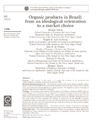Identificador persistente para citar o vincular este elemento:
https://accedacris.ulpgc.es/jspui/handle/10553/77004
| Campo DC | Valor | idioma |
|---|---|---|
| dc.contributor.author | Dalcin, Dionéia | en_US |
| dc.contributor.author | Leal de Souza, Angela R. | en_US |
| dc.contributor.author | de Freitas, João B. | en_US |
| dc.contributor.author | Padula, Antonio D. | en_US |
| dc.contributor.author | Dewes, Homero | en_US |
| dc.date.accessioned | 2020-12-27T18:52:03Z | - |
| dc.date.available | 2020-12-27T18:52:03Z | - |
| dc.date.issued | 2014 | en_US |
| dc.identifier.issn | 0007-070X | en_US |
| dc.identifier.other | WoS | - |
| dc.identifier.uri | https://accedacris.ulpgc.es/handle/10553/77004 | - |
| dc.description.abstract | Purpose - The purpose of this paper is to analyse the evolution of the production and commercialisation of organic products in Brazil since 1980.Design/methodology/approach - The literature review in this study assesses scientific papers, studies conducted by Brazilian and international institutions, and trade news related to the evolution of the production and commercialisation of organic products. The analysis is based on theories of consumer behaviour and competitive strategies.Findings - The results provide evidence that the organic food market in Brazil was initially based on social ideology and a movement that was opposed to conventional farming; however, since 1980, the supply and demand patterns have changed. The commercialisation of organic products since the turn of the decade has expanded beyond ideological motivation and into the Brazilian agribusiness sector. The main reasons for this expansion are changes in preferences by the Brazilian consumer, a substantial number of whom have become more concerned with the nutritional value and quality of the food they eat. This study also demonstrates that in Brazil, as well as in other countries, organic products have become a market trend.Research limitations/implications - The limited research material concerning the ideological aspects of production and trading of organic products is a factor to be considered with respect to this study.Originality/value - The presentation of comparative elements for two phases of organic agricultural development in Brazil, especially by the establishment of comparative elements, provide value and originality to this study. | en_US |
| dc.language | eng | en_US |
| dc.relation.ispartof | British food journal (1966) | en_US |
| dc.source | British Food Journal [ISSN 0007-070X], v. 116 (12), p. 1998-2015, (2014) | en_US |
| dc.subject | 531201 Agricultura, silvicultura, pesca | en_US |
| dc.subject | 531211 Comercio | en_US |
| dc.subject.other | Retailing | en_US |
| dc.subject.other | Consumer | en_US |
| dc.subject.other | Organics | en_US |
| dc.title | Organic products in Brazil: from an ideological orientation to a market choice | en_US |
| dc.type | info:eu-repo/semantics/Article | en_US |
| dc.type | Article | en_US |
| dc.identifier.doi | 10.1108/BFJ-01-2013-0008 | en_US |
| dc.identifier.scopus | 84926287102 | - |
| dc.identifier.isi | 000348441200012 | - |
| dc.contributor.authorscopusid | 56582173100 | - |
| dc.contributor.authorscopusid | 55201257600 | - |
| dc.contributor.authorscopusid | 56581454300 | - |
| dc.contributor.authorscopusid | 34971803400 | - |
| dc.contributor.authorscopusid | 6701731988 | - |
| dc.identifier.eissn | 1758-4108 | - |
| dc.description.lastpage | 2015 | en_US |
| dc.identifier.issue | 12 | - |
| dc.description.firstpage | 1998 | en_US |
| dc.relation.volume | 116 | en_US |
| dc.investigacion | Ciencias Sociales y Jurídicas | en_US |
| dc.type2 | Artículo | en_US |
| dc.contributor.daisngid | 16251145 | - |
| dc.contributor.daisngid | 4432731 | - |
| dc.contributor.daisngid | 3214567 | - |
| dc.contributor.daisngid | 2097113 | - |
| dc.contributor.daisngid | 1298569 | - |
| dc.description.numberofpages | 18 | en_US |
| dc.utils.revision | Sí | en_US |
| dc.contributor.wosstandard | WOS:Dalcin, D | - |
| dc.contributor.wosstandard | WOS:de Souza, ARL | - |
| dc.contributor.wosstandard | WOS:de Freitas, JB | - |
| dc.contributor.wosstandard | WOS:Padula, AD | - |
| dc.contributor.wosstandard | WOS:Dewes, H | - |
| dc.date.coverdate | Enero 2014 | en_US |
| dc.identifier.ulpgc | Sí | en_US |
| dc.description.sjr | 0,479 | |
| dc.description.jcr | 0,772 | |
| dc.description.sjrq | Q2 | |
| dc.description.jcrq | Q3 | |
| dc.description.scie | SCIE | |
| dc.description.erihplus | ERIH PLUS | |
| item.fulltext | Con texto completo | - |
| item.grantfulltext | open | - |
| Colección: | Artículos | |
Citas SCOPUSTM
14
actualizado el 08-jun-2025
Citas de WEB OF SCIENCETM
Citations
15
actualizado el 08-feb-2026
Visitas
94
actualizado el 10-ene-2026
Descargas
158
actualizado el 10-ene-2026
Google ScholarTM
Verifica
Altmetric
Comparte
Exporta metadatos
Los elementos en ULPGC accedaCRIS están protegidos por derechos de autor con todos los derechos reservados, a menos que se indique lo contrario.
